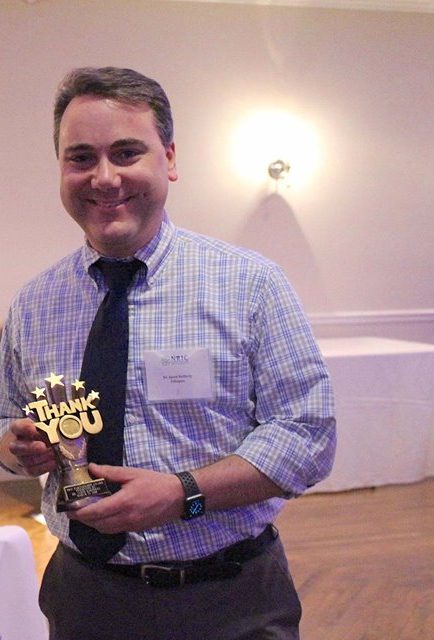Dr. Jason Rafferty, an attending psychiatrist and pediatrician at Thundermist Health Center, Hasbro Children’s Hospital and Emma Pendleton Bradley Hospital, provides comprehensive behavioral health evaluation and intervention to patients of all ages at the center.
He has a special interest in the complex issues surrounding adolescent development, specifically adolescent addiction and LGBTQ experiences. He sits on several committees concerned with youth mental health.
Rafferty attended Harvard University where he received a Doctorate of Medicine, Master of Public Health and Master of Education. Upon graduating, he completed a triple board residency, with interdisciplinary training in pediatrics, general psychiatry, and child and adolescent psychiatry.
Providence Business News reached out to Rafferty for some insight into his work at Thundermist.
PBN: The Northern Rhode Island Collaborative recently honored you for your cooperation and commitment to the students and staff at the collaborative. Please tell us about your work with them.
RAFFERTY: Thundermist Health Center collaborates with the Northern Rhode Island Collaborative to expand access to psychiatric services to an underserved population. The collaborative offers programs and services to children with significant developmental disabilities and behavioral concerns. We work with their behavioral health team to enhance the therapeutic and academic services they provide to include psychiatric care.
The staff at the Northern Rhode Island Collaborative is working therapeutically and academically with their students each day. Through close communication, our agencies work collaboratively to provide high-quality care to children and families in Northern Rhode Island who previously faced barriers to accessing such services.
PBN: You will be joining the staff at the school-based health center at Woonsocket High School. What will your work entail?
RAFFERTY: I previously taught eighth grade and saw firsthand the importance of school in children’s lives. Kids spend a lot of their time in the classroom. Staff at the school knows each student and their unique needs. It makes sense to deliver health care in a comfortable and familiar setting, and coordinate with school employees who interact with the students daily.
There are few locations in which psychiatric care is embedded within a school. Thundermist’s school-based health center, Health Hut, will now offer psychiatric care, medication management, therapy and family support in collaboration with school social workers.
We collaborate well with families when providing psychiatric care to children. We’ll now be able to work closely with school staff who are also an important part of students’ day-to-day lives.
PBN: How long has your work been focused on youth mental health?
RAFFERTY: I became interested in being a pediatrician at a young age. When I became a teacher, my passion for working with adolescents grew stronger. During my schooling, I spent a lot of time training in the area of child development, and I believe this informed my decision to pursue the combination of pediatrics and psychiatry.
My work has allowed me the opportunity to work in a variety of settings and with vulnerable populations. Each patient comes to us with a variety of needs that must be recognized. It was important to me to develop a perspective that appreciates the physical and behavioral health needs of each child and family within their community. The integrated approach to care at Thundermist allows me to connect patients with services and resources to meet their needs.
PBN: What are the primary challenges facing young people today?
RAFFERTY: The challenges facing children aren’t new, but the focus has changed. Young people are going through substantial transitions as they become more autonomous but also need strong support from their families, schools and communities as they navigate social challenges. It can be difficult for kids and families to balance autonomy and support.
There’s also a lot of big social questions that can weigh heavily on young people, such as school safety, acceptance of differences and even the effect of strong political rhetoric. We need to recognize those concerns and support them.
The greatest challenge I see is promoting openness around emotions. We need to help our youth feel validated and supported with the difficult emotions they navigate through adolescence.
We also must recognize the influence of trauma in a child’s life. Health care providers must remember that everyone has the potential to have endured trauma. Even at a very young age, trauma can have a profound effect on child development.
However, I also believe children and adolescents are incredibly resilient. Following the Parkland school shooting in Florida, we saw that youth can have a powerful voice. Children can mobilize and make a difference in the world. We need to create more opportunities for youth to speak out and have their voices heard.
PBN: What about your work do you find people commonly misunderstand?
RAFFERTY: Many people think psychiatry is all about medication and it’s not. We work to understand the needs of diverse populations of kids. We work with families so parents can learn how to best support their children. And, we’re connecting with schools and community leaders to advocate for additional resources that will be important to helping a child succeed.
Rob Borkowski is a PBN staff writer. Email him at Borkowski@PBN.com.













